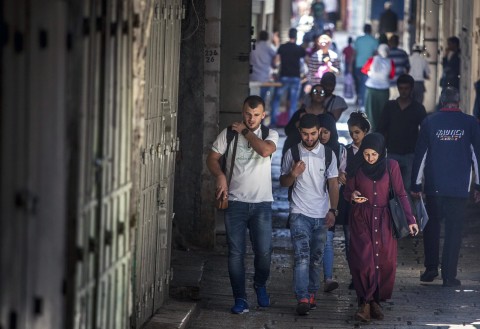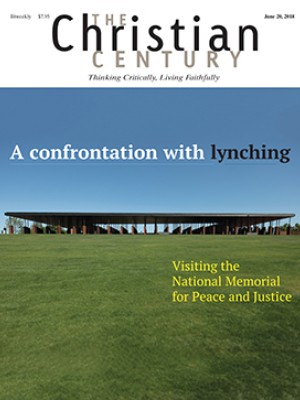U.S. embassy move to Jerusalem fulfills prophecy for some, causes mourning for others
The day after the embassy move was the anniversary of Israel's founding—a day Palestinians call the catastrophe, when hundreds of thousands of Palestinians fled or were expelled from their homes.

When U.S. and Israeli officials inaugurated the first-ever U.S. embassy in Jerusalem on May 14, more than 100 evangelical Christians were on hand, as well as scores of American Jews, many of them Orthodox, including Jared Kushner and Ivanka Trump.
Some evangelical Christians and Orthodox Jews saw the embassy’s move as fulfillment of divine prophecy and a step toward the coming of the messianic era.
“When the world’s most powerful nation establishes its embassy in our eternal capital, we see the further realization of the ancient prophecy of how we have come home to rejoice in this ancient city,” said David Stav, founder of Tzohar, a rabbinical organization in Israel.
Read our latest issue or browse back issues.
A major difference between evangelical Christian hopes and Jewish views is timing. Some Christian believers think the final advent is just around the corner, while Jews “recognize that it can take a long time before fruition,” said David Rosen, director of the American Jewish Committee’s International Interreligious Affairs.
President Trump’s December 2017 decision to move the embassy from Tel Aviv to Jerusalem spurred criticism from those who believe it impedes a broader peace settlement in the Middle East by denying Palestinian claims to the city.
In 1947, when the United Nations voted to create both a Jewish state and an Arab state, it envisioned Jerusalem being governed by an international body. But after Arab armies attacked the fledgling Jewish state, Israel took control of West Jerusalem and Jordan took control over East Jerusalem.
Israel captured East Jerusalem during the 1967 Middle East war and annexed the disputed territory in 1980, but until December no nation had recognized Israeli sovereignty over any part of the city that is holy to Jews, Christians, and Muslims.
The vast majority of Christians in the Holy Land identify as Palestinians, according to the Pew Research Center, and, like their Muslim counterparts, want East Jerusalem to be the capital of a future Palestinian state.
In a December 6 letter to President Trump, leaders of local churches, from Catholic and Orthodox to evangelical, pleaded with the president not to relocate the embassy.
“We are certain that such steps will yield increased hatred, conflict, violence, and suffering in Jerusalem and the Holy Land, moving us farther from the goal of unity and deeper toward destructive division,” the leaders said.
May 15, the day after the embassy relocation, was the 70th anniversary of Israel’s founding, what Palestinians call the Nakba, or “catastrophe,” when hundreds of thousands of Palestinians fled or were expelled from their homes during the 1948 Israel-Arab war. Palestinian leaders ordered the public to shutter stores, schools, and government offices. In addition to protesting the embassy move and Israel’s partial blockade of Gaza, the protest was an act of mourning for the Nakba and for the more than 60 Palestinians killed by Israeli forces at the Israel-Gaza border the day before.
This year, the Nakba coincided with the first night of the holy month of Ramadan. Mohammed Dajani, founder of the Wasatia movement, which calls for moderation and tolerance within Palestinian society and Islam, said Ramadan helps Muslims channel their suffering into compassion.
“The underlying principle of Ramadan is to feel the suffering and pain of others and to have empathy for others, so the fact that there is suffering gives Ramadan that much more meaning,” Dajani said. “I believe that from this suffering will emerge something good. We have to believe that God is testing us, and that eventually will open a window of hope for us.”
Imad Muna, owner of an East Jerusalem bookstore, was three years old when Israel seized control of the eastern side of the city from Jordan during the 1967 war. Muna called it a crime that the U.S. government “unilaterally” decided to relocate its embassy from Tel Aviv to Jerusalem, especially during the week that Palestinians commemorate the Nakba.
“The final status of Jerusalem is one of the five issues Israelis and Palestinians once vowed to solve through peace negotiations,” he said.
“Jerusalem is not Gaza,” he acknowledged, alluding to the social benefits and freedom of movement Palestinians in Jerusalem enjoy, unlike those in Gaza and the West Bank. “But we all share the suffering. What happened in Gaza yesterday affects all Palestinians.” —Religion News Service
A version of this article, which was edited on June 12, appears in the print edition under the title “U.S. embassy move fulfills prophecy for some, causes mourning for others.”






